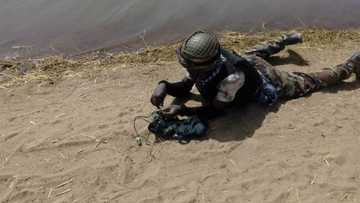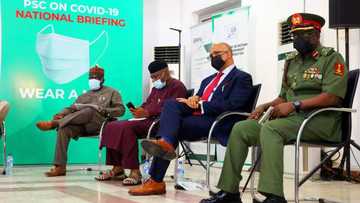Ali Must Go: Historical 1978 Protest that Led to Deaths, Legitimised Power of Nigerian Students
- The 1978 Ali Must Go Protest was masterminded by angry students of tertiary institutions following an increase in fees
- The student crisis has been tagged as one of the bloody agitations in Nigeria to date
- During the time of the sad protests, it ignited the greatest political crisis of 1975–1979 Mohammed/Obasanjo military administration
PAY ATTENTION: Сheck out news that is picked exactly for YOU ➡️ find the “Recommended for you” block on the home page and enjoy!
General Olusegun Obasanjo's military regime witnessed a deadly protest after it was announced that students would begin to pay extra fees.
Dr. Jibril Aminu, the then Secretary of the Nigerian University Commission (NUC) made the announcement citing the 'high cost of living in the country' as the reason for the increment.

Source: UGC
Following the news, students held meetings in different states in Nigeria before deciding to stage protests.
Legit.ng in this article explores the 1978 Ali Must Go Protests, the causes and aftermath.
PAY ATTENTION: Join Legit.ng Telegram channel! Never miss important updates!
Overview of 1978 Ali Must Go Protests
The Ali Must Go Protests also called Students Crisis, happened during the military regime led by Olusegun Obasanjo.
This was after Dr. Jibril Aminu, the Secretary of the Nigerian University Commission revealed that school fees of tertiary institutions would be increased.
Dr. Jibril had announced that the increment was due to the high cost of living in the country.
The Nigerian University Commission stated that although tuition fee was to remain free for all undergraduates, hostel fees would be increased to ₦90 per student per session of 36 weeks or ₦30 per student in a session of three terms.
The cost of meal tickets also skyrocketed from ₦1.50 to ₦2.00.
Students' reaction to news of school fees increment

Read also
Malami: Trouble for terrorists in Nigeria as Buhari approved funds for prosecution of Boko Haram suspects
Segun Okeowo, the former president of the National Union of Nigerian Students (NUNS) at the time, was a student at the University of Lagos and felt bitter about the news.
He took steps to change the decision as it was not pleasant at all for the students.
The agitated students had scheduled meetings in Ilorin, Maiduguri, and Calabar to seek solutions for the increment to be subsidised.
After holding several meetings, they decided to take the bold step of challenging the military government on the increment.
Apart from the fees, the students had also claimed that tertiary education was suffering because there were very few federal government-owned universities and no private or state-owned universities.
They insisted that tertiary education was seen as a privilege and that the federal government could not cope with the number of people seeking admission.
For this reason, as well as the increase in fees, the students in unison decided to kickstart series of protests.
The then Minister of Education, Ahmadu Ali was said to have masterminded the increment, but he tried to shift responsibility to the Supreme Military Council claiming that the increment was made by the Supreme Military Council. This ignited the protest chant, 'Ali Must Go'.
Protests kick off as students challenge military government
To make the Federal Military Government make a u-turn about the increase in fees, students of tertiary institutions whose local unions were affiliated with NUNS first decided to boycott lectures.
They kickstarted this on the 17th of April 1978 but subsequently understood that the government wasn't willing to give in to their demands.
Due to the government's insistence on increment, the students resorted to public demonstrations.
Okeowo gathered students across the country and tried to create public awareness about their situation.
During the second day of the protests, there was a battle between the students and the Nigerian Police at the University of Lagos.
Akintunde Ojo, an architecture student at the University of Lagos was shot in the leg and bled to death because he was denied care at LUTH and Orthopedic Hospital, Igbobi.
Following the sad news, Okeowo sent word to his colleagues at the University of Ibadan, Ahmadu Bello University, Zaria and other federal universities. The protests caught more fire and the students were in open confrontations with both the Nigerian Army and Police which saw about 8 students getting killed in Zaria by soldiers.
The students refused to back out despite the deployment of soldiers. The protests spiralled beyond university campuses leading to fear and apprehension among the populace.
Aftermath of the Ali Must Go Protests
After a week of students crisis, the Federal Military Government closed all universities and ordered the students to go home.
Three universities were shut indefinitely and NUNS was banned. There was also widespread looting and crisis throughout the country.
Despite the violence and bloodshed, the increment was not reversed, but the ‘Ali Must Go’ protest legitimised the power of Nigerian students as it conveyed to the military government, the ability of students to strategically gather across the country and carry out effective agitation and force change. The protest also helped to further mainstream student unionism.
Okeowo was expelled from the University of Lagos for the role he played in the protests. He however graduated from the University of Ife (now Obafemi Awolowo University) two years later with a bachelor's degree in Education. He kicked the bucket on January 28, 2014, aged 73.
History of Aba women riot of 1914
Meanwhile, Legit.ng previously reported that the Aba women's war dates back to November 1929 when thousands of women stormed the streets to protest against the warrant chiefs.
These chiefs who had powers vested in them by the community elders were accused by the women of restricting their role in the government. During the war, it was reported that over 10,000 women faced assault which caused the death of over 50 women.
The protest did not only uphold the rights of women but also greatly improved their status of being functional not only at home but also during revolutionary projects.
Source: Legit.ng






